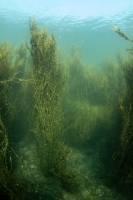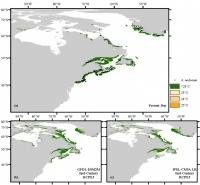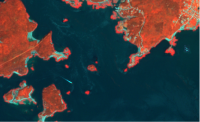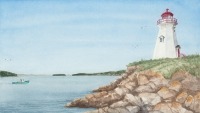
Kristen Wilson,
Seaweed Researcher
Kristen Wilson is an early career research scientist at Dalhousie University in Halifax, Nova Scotia and with Fisheries and Oceans Canada. She studies the seaweed and eelgrass forests found around our coasts. Kristen’s research focuses on mapping seaweeds and eelgrass using satellites. This helps us understand and manage seaweed habitats and how environmental changes such as climate change might affect them.
Dive DeeperMarine Career Interview
What do you do?
I’m a Research Scientist who specializes in marine ecology; I study the interaction of marine species with each other or their environment. I usually focus on interaction with the environment, including the impacts of climate change on marine species.
Are there any marine organisms that particularly interest you?
I’m interested in the vegetation that grows in coastal habitats, like seaweeds! Seaweeds (sometimes called macroalgae) are not plants. In fact, the name seaweed refers to three very different groups known as brown, red, and green seaweeds. Seaweeds don’t have the same structure as plants. Instead of roots they use a holdfast to attach themselves to rocks on the seafloor. Instead of a stem and leaves, seaweeds have fronds that absorb all the nutrients they need to survive from the surrounding water.
Where do you work?
As an early career scientist, my position changes often. I’m currently working as an Aquatic Science Biologist with Fisheries and Oceans Canada. My work uses satellites to map the distribution of vegetation (like seaweeds) in coastal habitats. I also work with the Ocean Frontier Institute at Dalhousie University. We try to understand how climate change may impact the distribution of marine species in Atlantic Canada.
Why is seaweed important?
I like to describe seaweed as the trees of the ocean. Seaweed “forests” provide important three-dimensional habitat to fish and invertebrates in coastal waters. Seaweeds are also important in nutrient cycling and long-term storage of carbon and nitrogen. They also have commercial importance. We use seaweed in fertilizer, animal feed, and a wide variety of food products such as chocolate milk!

Seaweeds like this rockweed form dense forests underwater that are important habitats for fish and invertebrates. (Photo: Claire Goodwin)
What impact is climate change likely to have on seaweed?
In Atlantic Canada, most of our seaweed species have adapted to growing in cold waters. This makes them vulnerable to warmer sea temperatures driven by climate change. As temperatures continue to increase, we expect that seaweeds will be negatively affected. They likely won’t grow as large and will have a higher mortality rate. They will have to compete with warmer-water species that extend their range into this region.
Should we be concerned?
These effects have already decreased seaweed abundance in Nova Scotia and other parts of the world. Many seaweeds are shifting their range poleward as sea temperatures warm. My work shows we can expect these poleward range shifts to occur in Atlantic Canada within this century. This will cause several important species of seaweeds to lose large portions of their habitat range. This is worrying because it means there will be less habitat available for the fish and invertebrates. Unless warm-water-adapted seaweed species move in that provide similar habitat, we may lose these animal species too.

How rockweed (Ascophyllum nodosum) distribution might change by the end of the 21st century under different climate change scenarios. (Photo: Kristen Wilson, reproduced from Wilson et al. (2018).)
What does your typical day involve?
As a marine ecologist, I spend the bulk of my time analyzing data and turning my findings into scientific papers. A typical day may include reading a scientific paper to keep up to date with what other research groups have found, writing computer code to analyze data, or writing a scientific paper. The last one may be surprising, but as a research scientist, you spend a large part of your time communicating your findings to other scientists. Lab and fieldwork are not part of my typical day unless I’m actively running a lab experiment or completing a fieldwork program.
What do you enjoy most about your job?
Working on climate change research can be disheartening. I’m acutely aware of the negative consequences of climate change on our world’s oceans. Yet I enjoy knowing that my job is helping us to fully understand the impacts of climate change on seaweeds. This means we’ll be better informed on how to protect these species in the future. For instance, my work shows that if we make large cuts to global carbon emissions and limit temperature increases, climate change impacts to seaweeds will be minimal. This is good news and provides direction on how to protect seaweeds and the critical habitat they provide in a warming world.
What is an important qualification for your work?
An important qualification for my work was the completion of my Master of Science degree in biology. Postgraduate degrees are essential to work in science as they teach you the backbones of research. You begin by asking a question about anything, for me it was “How will climate change impact seaweed distribution in the Northwest Atlantic Ocean?” You then thoroughly research other scientific papers to get an understanding of what work has been done on the topic. From these, you can see what statistical tools other scientists have used to address the topic, and where the research gaps are. The skills you develop throughout this process are transferable to any position you may work in afterward.
Now that you have completed your MSc, what do you hope to do in the future?
In the future, I hope to use my background in marine ecology to aid in ocean conservation. This could be in helping to minimize the impact of climate change or other human activities on marine species in coastal habitats. Or in helping to establish protected areas. Further post-graduate work is a possibility. But for now, I plan on building my resume and gathering as many diverse work experiences as possible.
What inspired you to work in marine biology?
As a child, I was always fascinated by the natural world around me. One day my parents bought me a book about dolphins, and despite growing up in a land-locked town, this book got me hooked on the ocean. This obsession grew until I discovered I could go to university to study marine biology and make a career out of working on ocean conservation.
Any advice for people wanting to work in this field?
I strongly encourage you to enroll in an undergraduate program that does co-operative work placements. These will introduce you to different real-life work scenarios to help you decide what you like and don’t like in a job. With that, try to keep your work placements and course selections as diverse as possible. I originally went into marine biology to study dolphins, but through the course of my studies discovered a passion for seaweeds. That would never have happened if I hadn’t enrolled in a diversity of algae course.



